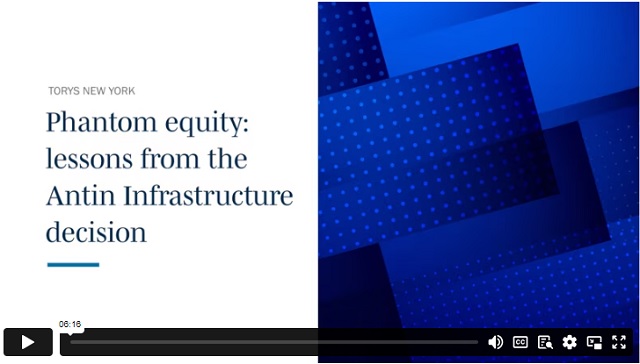Video Transcript
Meghan McKeever (00:06): Phantom equity can be a strategic way to compensate employees or contractors with something resembling stock, but without giving up stock in the company. But what happens when a company with phantom equity is sold? What should buyers and sellers watch out for? And how can they prevent misunderstandings that could sink the deal? I'm Meghan McKeever. I'm here with my partner Ellie Kang from Torys' New York office to answer these questions.
And in the process, we'll check in on a recent case from Delaware and then we'll help share some tips to help you avoid common pitfalls of phantom equity. So, Ellie, what is phantom equity?
Ellie Kang (00:41): Well, Meghan, like you said, it's an alternative way to compensate employees and also contractors and other types of service providers. It grants the recipients a right to future payments that tracks the value of the company's equity over time, either in full or in parts. But because it's not actual equity, it's called "phantom equity", sometimes also called a "shadow equity".
Employers can benefit from phantom equity because they don't need to give away actual stock in the company so they can avoid diluting the existing shareholders. And those who are receiving phantom equity will receive the economics of the compensation that they're otherwise entitled to.
Meghan McKeever (01:20): Okay. Thanks, Ellie. That's super helpful. And that brings us to our recent cautionary tale from the courts. So, to set the stage, in December 2022 Antin Infrastructure Partners, a French private equity firm, entered into a merger agreement with OpticalTel, a group of broadband companies. In the course of the deal Antin conducted a lengthy diligence process, but they missed one important item.
So back in 2004, OpticalTel had engaged a coder named Rafael Marquez to implement certain software for OpticalTel. Marquez had entered into a software development agreement with OpticalTel, and as part of his compensation he would receive 5% ownership of an OpticalTel subsidiary, which would be distributed upon a liquidation event. So fast forward to 2022, as the sale was closing, Marquez brought a claim that he owned outstanding equity interest in this company and was entitled to a large sum following the closing.
So in March 2023 Antin infrastructure terminated the merger agreement, claiming that OpticalTel breached its capitalization rep, and accordingly, OpticalTel was unable to bring down its closing conditions. The capitalization rep included a representation that there was no outstanding phantom equity or similar rights. So in the end, the court found that the coder's alleged ownership right was similar to the phantom equity described in the capitalization reps, which entitled him to a portion of the merger proceeds.
But more importantly, the court ruled that Antin Infrastructure was entitled to terminate the merger agreement over the breach.
Ellie Kang (02:56): It's not surprising that the Delaware Court decided for Antin Infrastructure. Phantom equity can be a useful part of an organization's compensation strategy, but this case really is an effective reminder of its risks. So let's run through four practice points to keep in mind when dealing with phantom equity. The first practice point here is to consider phantom equity arrangements when preparing disclosure schedules. Capitalization and other representations of a typical transaction agreement require the disclosure of phantom equity arrangements, and that broadly includes really any compensation arrangement that provides anyone with a right to payment where the value or the amount of the payment is calculated in reference to the company's equity.
And so sellers should pay particular attention to the scope of the disclosure requirements under the transaction agreement that could extend well beyond stock options, profit interest and other types of the more traditional equity or equity-based awards.
Meghan McKeever (03:57): Thanks. And a second practice point here is to include a de minimis qualifier in the bring-down of certain reps. So the bring-down provisions of the merger agreement in this case didn't contain any de minimis or materiality qualifier, and that might have prevented Antin from terminating the merger agreement, as Marquez's claim was relatively minor in the scope of the deal.
So sellers should negotiate for these qualifiers where possible, particularly in the capitalization rep, where de minimis inaccuracies are pretty frequent.
The third practice point here is to look broadly for phantom equity arrangements during diligence. Both the buyer and the seller in a transaction should keep in mind that phantom equity arrangements may not be included in a typical compensatory document like an employment agreement or an incentive plan document, or an award agreement. In this Delaware case, the phantom equity was providing a software development agreement.
Ellie Kang (04:52): But really the phantom equity could also be memorialized in other types of documents. It could even be included in a back-of-the-envelope style side letter, or it could be communicated via email or orally. And so that brings us to the final practice point. That is to seek legal advice when implementing any type of arrangement where future payments are linked to the company's equity.
It's not always obvious when something will be considered phantom or shadow equity. So whenever you're considering giving employees a right to future payments that tracks the value of the company, you're adding some risk that that arrangement may not be in full compliance with various technical and other related requirements surrounding the arrangements. And that is true even if the arrangement is not expressly called a "phantom equity".
And depending on how phantom equity's drafted or how long ago it was granted, it may not always be possible to unwind the noncompliant arrangement without incurring significant tax and other liabilities. And therefore, prevention and early detection are really key to implementing a successful phantom equity arrangement if you want to protect your organization.
Phantom equity can be a practical way to compensate employees without giving up stock in the company. But as a recent court decision out of the U.S. highlights, this type of compensation arrangement can scuttle a later sale of the company if not handled properly.
In this video, private equity partner Meghan McKeever and tax partner Ellie Kang from our New York office analyze the impact of the decision on phantom equity in dealmaking. You'll learn:
- Why phantom equity arrangements are not always easy to spot
- Why the judge in this case allowed the buyer to terminate the merger agreement
- How buyers can help ensure no phantom equity arrangements exist
- What to insert in a merger agreement to protect against potential phantom equity provisions
To view the full articles please click here.
The content of this article is intended to provide a general guide to the subject matter. Specialist advice should be sought about your specific circumstances.


